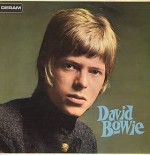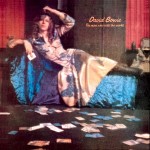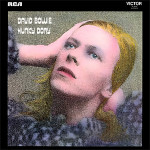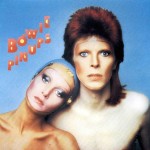Starting today and continuing for the next few weeks, I’ll be looking back at the entire recorded catalog of one of my favorite recording artists, David Bowie. Why? Well, because his new album comes out tomorrow and I hear it’s quite good. This project is going to take a while, so let’s get started. First up, the early years: from pop to psychedelic folk to glam rock.
It’s worth noting that the following albums are probably my favorite of Bowie’s entire career, I really like his early stuff. That said, this is not necessarily what he is, or at least was, know for.

 After assuming a new surname to not be confused with The Monkee’s Davy Jones, David Bowie released a self-titled debut album the same day that The Beatles’ Sgt. Pepper’s Lonely Hearts Club Band came out. For that reason, it’s easy to guess that David Bowie was a fairly overlooked album. Not only could it not compete with The Beatles’ magnum opus, it stands in harsh juxtaposition to the rest of Bowie’s library as being musically fairly routine and, dare I say, boring? No, I won’t go that far, because with Bowie as the songwriter, there are at least a lot of interesting subjects tackled over the album’s 14 tracks. “We Are Hungry Men,” for example, is a tale about a dystopian world in which society is forced to turn to cannibalism in the face of a food crisis, complete with the legalization of mass abortions. Yeah.
After assuming a new surname to not be confused with The Monkee’s Davy Jones, David Bowie released a self-titled debut album the same day that The Beatles’ Sgt. Pepper’s Lonely Hearts Club Band came out. For that reason, it’s easy to guess that David Bowie was a fairly overlooked album. Not only could it not compete with The Beatles’ magnum opus, it stands in harsh juxtaposition to the rest of Bowie’s library as being musically fairly routine and, dare I say, boring? No, I won’t go that far, because with Bowie as the songwriter, there are at least a lot of interesting subjects tackled over the album’s 14 tracks. “We Are Hungry Men,” for example, is a tale about a dystopian world in which society is forced to turn to cannibalism in the face of a food crisis, complete with the legalization of mass abortions. Yeah.

 Space Oddity was released in the U.S. as Man of Words/Man of Music, maybe because they didn’t think the Kubrick reference was a good idea? Yeah, I don’t know. What I do know is that this album is important in the Bowie discography not only because we hear him work toward a more unique sound, but because of the title track. “Space Oddity” both introduces the world to Major Tom and is probably the earliest David Bowie song the uninitiated fans know. It’s a hell of a track on an album much easier to get into than David Bowie. He still is experimenting with what he wants to do, from the Dylan-esque “Unwashed and Somewhat Slightly Dazed” to the somewhat anthemic “Memory of a Free Festival,” but already he’s put together an album I’d recommend people check out.
Space Oddity was released in the U.S. as Man of Words/Man of Music, maybe because they didn’t think the Kubrick reference was a good idea? Yeah, I don’t know. What I do know is that this album is important in the Bowie discography not only because we hear him work toward a more unique sound, but because of the title track. “Space Oddity” both introduces the world to Major Tom and is probably the earliest David Bowie song the uninitiated fans know. It’s a hell of a track on an album much easier to get into than David Bowie. He still is experimenting with what he wants to do, from the Dylan-esque “Unwashed and Somewhat Slightly Dazed” to the somewhat anthemic “Memory of a Free Festival,” but already he’s put together an album I’d recommend people check out.
Favorite Tracks: “Space Oddity,” “Letter to Hermione,” “Cygnet Committee”

 Next, Bowie decided to get really heavy. So he dressed up like a lady and wrote some dark songs. The Man Who Sold the World is widely considered to be the first of Bowie’s classics, and I won’t really argue with that. But I will say the album pushes Bowie’s blues rock tendencies all the way to the border of heavy metal, and it’s not really the sound I’m looking for. Similarly, the songwriting seems a bit darker and a little less weird, as Bowie tackles the likes of insanity and Vietnam. The great title tack, “The Man Who Sold the World” seems to be about split personalities (or alien clones, you can never be too sure). I’m told this album is considered by some the birth of glam rock, so that’s something.
Next, Bowie decided to get really heavy. So he dressed up like a lady and wrote some dark songs. The Man Who Sold the World is widely considered to be the first of Bowie’s classics, and I won’t really argue with that. But I will say the album pushes Bowie’s blues rock tendencies all the way to the border of heavy metal, and it’s not really the sound I’m looking for. Similarly, the songwriting seems a bit darker and a little less weird, as Bowie tackles the likes of insanity and Vietnam. The great title tack, “The Man Who Sold the World” seems to be about split personalities (or alien clones, you can never be too sure). I’m told this album is considered by some the birth of glam rock, so that’s something.
Favorite Tracks: “Black Country Rock,” “She Shook Me Cold,” “The Man Who Sold the World”

 Yes, yes, a thousand times, yes. Hunky Dory is David Bowie coming into his own as a songwriter. This is his first album with producer Ken Scott and all the members of the band that would go on to be called The Spiders from Mars. This album is a bit all over the place, with popier songs like “Oh! You Pretty Things” to folkier ones like “Eight Line Poem,” as Bowie works out what will be his signature sound of this era. And all the while, he pays tribute to his influences, sometimes rather bluntly, like the back-to-back “Andy Warhol” and “Song for Bob Dylan,” which is pretty funny, since I think those guys hated each other. Hunky Dory is the first Bowie album I listened to and maybe my favorite. Five stars.
Yes, yes, a thousand times, yes. Hunky Dory is David Bowie coming into his own as a songwriter. This is his first album with producer Ken Scott and all the members of the band that would go on to be called The Spiders from Mars. This album is a bit all over the place, with popier songs like “Oh! You Pretty Things” to folkier ones like “Eight Line Poem,” as Bowie works out what will be his signature sound of this era. And all the while, he pays tribute to his influences, sometimes rather bluntly, like the back-to-back “Andy Warhol” and “Song for Bob Dylan,” which is pretty funny, since I think those guys hated each other. Hunky Dory is the first Bowie album I listened to and maybe my favorite. Five stars.
Favorite Tracks: “Changes,” “Life on Mars?,” “Queen Bitch”

 Bowie stops putting himself on the cover in drag just long enough to invent his first character: Ziggy Stardust. To quote an uncited Wikipedia articles, “Ziggy is the human manifestation of an alien being who is attempting to present humanity with a message of hope in the last five years of its existence. Ziggy Stardust is the definitive rock star: sexually promiscuous, wild in drug intake and with a message, ultimately, of peace and love; but he is destroyed both by his own excesses, and by the fans he inspired.” The songs of The Rise and Fall of Ziggy Stardust and the Spiders from Mars tell the man’s story, but Bowie himself assumed the Ziggy persona on tour. I hesitate to call it a concept album, as it is suitably theatrical, but the story is tricky to follow and honestly, this doesn’t need labels. This album is wall-to-wall classics, like literally I wrote a list of the songs I love off this album and it was the entire track list.
Bowie stops putting himself on the cover in drag just long enough to invent his first character: Ziggy Stardust. To quote an uncited Wikipedia articles, “Ziggy is the human manifestation of an alien being who is attempting to present humanity with a message of hope in the last five years of its existence. Ziggy Stardust is the definitive rock star: sexually promiscuous, wild in drug intake and with a message, ultimately, of peace and love; but he is destroyed both by his own excesses, and by the fans he inspired.” The songs of The Rise and Fall of Ziggy Stardust and the Spiders from Mars tell the man’s story, but Bowie himself assumed the Ziggy persona on tour. I hesitate to call it a concept album, as it is suitably theatrical, but the story is tricky to follow and honestly, this doesn’t need labels. This album is wall-to-wall classics, like literally I wrote a list of the songs I love off this album and it was the entire track list.
Favorite Tracks: “Starman,” “Lady Stardust,” “Ziggy Stardust”

 Aladdin Sane (get it? A lad insane) is most certainly a follow-up, an album that does not seem as inspired as the ones that came before it. Bowie himself called the album “Ziggy goes to America” which sounds like a lazy Hollywood sequel to me. But it would be a mistake to dismiss Aladdin Sane or even call it lazy, because it is far from that. It lacks the consistency of Ziggy, it doesn’t rock as much, but that’s a pretty negative outlook, don’t you think? This is a weird, fun album that I definitely think is worth checking out, if for nothing else, because it has the terrific “The Jean Genie” and for some reason a cover of “Let’s Spend the Night Together.”
Aladdin Sane (get it? A lad insane) is most certainly a follow-up, an album that does not seem as inspired as the ones that came before it. Bowie himself called the album “Ziggy goes to America” which sounds like a lazy Hollywood sequel to me. But it would be a mistake to dismiss Aladdin Sane or even call it lazy, because it is far from that. It lacks the consistency of Ziggy, it doesn’t rock as much, but that’s a pretty negative outlook, don’t you think? This is a weird, fun album that I definitely think is worth checking out, if for nothing else, because it has the terrific “The Jean Genie” and for some reason a cover of “Let’s Spend the Night Together.”
Favorite Tracks: “Watch That Man,” “Drive-In Saturday,” “The Jean Genie”

 The same year as Aladdin Sane, Bowie put together a covers album. Why? I can’t explain (this is a joke because he covers that Who song on this album). Maybe it was hubris? Maybe he thought, after years of putting out intensely original material, he would push his originality to the limit and see if he could find something new in other people’s songs? Like I said, I don’t really know. What we got was a smattering of mid-to-late Sixties British rock covers, many of which were pretty obscure, at least by my standards. I was disappointed that the “Don’t Bring Me Down” on Pin Ups is a cover of The Pretty Things song, not the ELO song that wouldn’t even be written for another few years. Anyway, clearly Bowie was running out of material, right? Well, he was done with The Spiders from Mars at this point, but actually he was far from out of material. It was just time for his first reinvention. But we’ll get into that next week.
The same year as Aladdin Sane, Bowie put together a covers album. Why? I can’t explain (this is a joke because he covers that Who song on this album). Maybe it was hubris? Maybe he thought, after years of putting out intensely original material, he would push his originality to the limit and see if he could find something new in other people’s songs? Like I said, I don’t really know. What we got was a smattering of mid-to-late Sixties British rock covers, many of which were pretty obscure, at least by my standards. I was disappointed that the “Don’t Bring Me Down” on Pin Ups is a cover of The Pretty Things song, not the ELO song that wouldn’t even be written for another few years. Anyway, clearly Bowie was running out of material, right? Well, he was done with The Spiders from Mars at this point, but actually he was far from out of material. It was just time for his first reinvention. But we’ll get into that next week.
Favorite Tracks: “Rosalyn,” “I Can’t Explain,” “Sorrow”

I never knew about the “A lad insane” thing. Good job on this, you’re a credit to your people son.